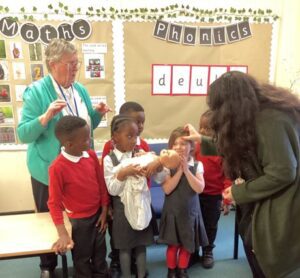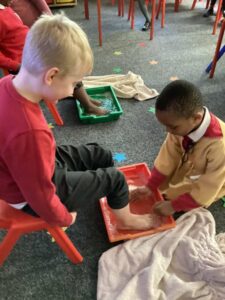We aim to provide a Catholic Religious Education, central to the ethos of the school derived from our Mission Statement.
‘We strive to love and serve Him
in all we do.’
We aim to develop religiously literate young people who have the knowledge, understanding and skills – appropriate to their age and capacity – to think spiritually, ethically and theologically, and who are aware of the demands of religious commitment in everyday life. We also foster an understanding and respect for those with different faiths and beliefs.




Working in partnership with the family and parish we seek to live and share our Catholic faith. This faith perspective is integral to the whole life of the school and all aspects of the curriculum.
Religious education is not confined to the R.E. lesson. Throughout the whole of the curriculum, topics arise which raise specific moral and religious issues. An adequate response will be given, in the light of teachings of the church.
With the Gospel Values at the centre of our school,
we aim to value, welcome, understand and support others.
We do this in partnership with family and parish.
The values we live and breathe at St Augustine’s are:

Come and See
At St. Augustine’s, we follow the Come and See programme of Religious Education. A curriculum that emphasises scripture, structured around the four key areas: Revelation, Church, Celebration, and Life in Christ. The curriculum follows an Explore, Reveal, Respond model for engaging children in learning.
Assessment and Reporting
There is a separate policy regarding assessment, recording and reporting in Religious Education.
Progress in R.E. is reported to parents annually at the end of the year and a newsletter is sent home each term to inform parents about the topics to be covered and the ways in which parents can support their child’s learning.
“The purpose of assessment, recording and reporting in religious education is to ensure effective learning, to celebrate growth and achievement and enable further progress.”
NBRIA 1997









